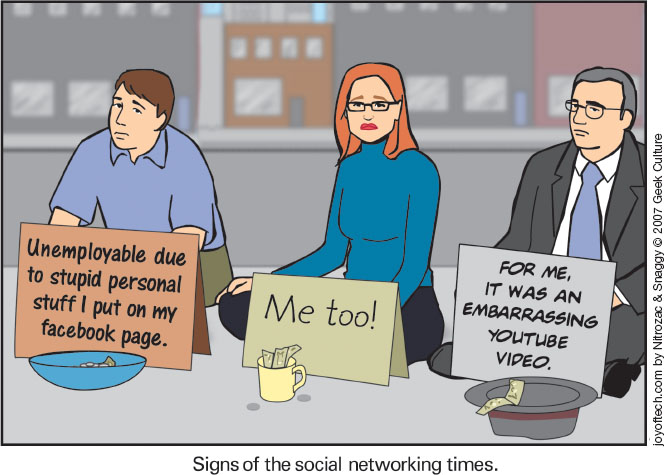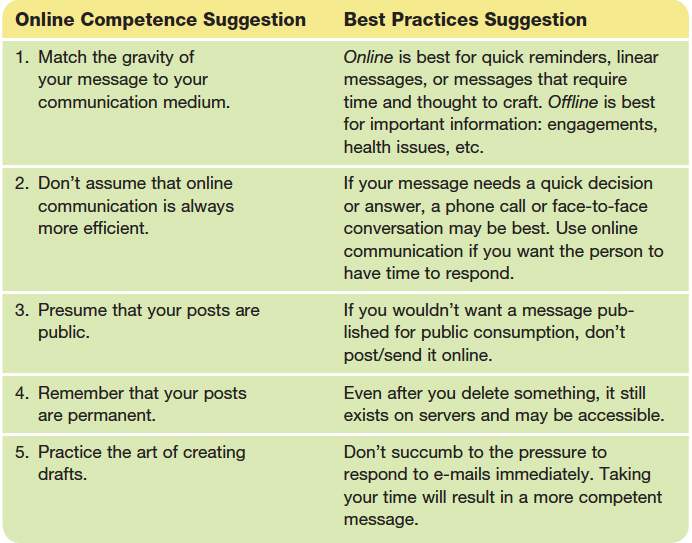1.2.6 Improving Your Competence Online
Printed Page 24
Improving Your Competence Online
Much of our interpersonal communication occurs online, through e-mail, text, instant-messaging, and posting on social networking sites such as Facebook. This provides enormous benefits. It enables us to meet and form friendships and romances with people we wouldn’t encounter otherwise, and it helps us maintain established relationships (Howard, Rainie, & Jones, 2001). It also bolsters our sense of community. Whereas people used to gather around the proverbial watercooler to chat, now social networking sites, discussion groups, and blogs are gathering places (Shedletsky & Aitken, 2004). In our study of interpersonal communication, we use online communication to refer to any interaction by means of social networking sites (such as Facebook), e-mail, text- or instant-messaging, Skype, chatrooms, and even massively multiplayer video games like World of Warcraft (Walther & Parks, 2002).

Given how often we use technology to interpersonally communicate, building online competence becomes extremely important. Based on years of research, scholar Malcolm Parks offers five suggestions for improving your online communication competence (see Table 1.2).2
-
Match the gravity of your message to your communication medium. An essential part of online competence is knowing when to communicate online versus offline. For many interpersonal goals, online communication is more effective. Text-messaging a friend to remind her of a coffee date makes more sense than dropping by her workplace, and it’s probably quicker and less disruptive than calling her. E-mail may be best when dealing with problematic people or certain types of conflicts. That’s because you can take time to think and carefully draft and revise responses before sending them—something that isn’t possible during face-to-face interactions.
But online communication is not the best medium for giving in-depth, lengthy, and detailed explanations of professional or personal dilemmas, or for conveying weighty relationship decisions. Despite the ubiquity of online communication, many people still expect important news to be shared in person. Most of us would be surprised if a spouse revealed a long-awaited pregnancy through e-mail, or if a friend disclosed a cancer relapse through a text message.
- Don’t assume that online communication is always more efficient. Matters of relational significance or issues that evoke strong emotional overtones are more effectively and ethically handled in person or over the phone. But so too are many simple things—like deciding when to meet and where to go to lunch. Many times, a one-minute phone call or quick, face-to-face exchange can save several minutes of texting.
- Presume that your posts are public. You may be thinking of the laugh you’ll get from friends when you post the funny picture of you drunkenly hugging the houseplant on Facebook. But what about family members, future in-laws, or potential employers who see the picture? That clever joke you made about friend A in an e-mail to friend B—what if B forwards it to C who then forwards it to A? Even if you have “privacy settings” on your personal page, what’s to stop authorized-access friends from downloading your photos and posts and distributing them to others? Keep this rule in mind: anything you’ve sent or posted online can potentially be seen by anyone.
- Remember that your posts are permanent. The things you say online are like old TV shows: they hang around as reruns forever. Old e-mails, photographs, videos, and blogs—all of these may still be accessible years later. As just one example, everything you have ever posted on Facebook is stored on their server, whether you delete it from your profile or not. And Facebook legally reserves the right to sell your content, as long as they delete personally identifying information (such as your name) from it. One of my students learned this the hard way, when he saw a personal family photo he had uploaded to Facebook packaged as the “sample photo” in a gift frame at a local store. Think before you post.
- Practice the art of creating drafts. Get into the habit of saving text and e-mail messages as “drafts,” then revisiting them later and editing them as needed for appropriateness, effectiveness, and ethics. Because online communication makes it easy to flame, many of us impetuously fire off messages that we later regret. Sometimes the most competent online communication is none at all—the result of a process in which you compose a text, save it as a draft, but delete it after reviewing it and realizing it’s incompetent.
Table 1.2 Online Communication Competence

Online Competence
- Become a more competent online communicator.
- Before communicating online, ask yourself: is the information important or complicated; or does it require a negotiated decision? If so, call or communicate face-to-face instead.

- Don’t share content you consider private. Anything you text, e-mail, or post can be exported elsewhere by anyone who has access to it.

- Save messages as drafts, then revisit them later, checking appropriateness, effectiveness, and ethics.

- When in doubt, delete, don’t send!
